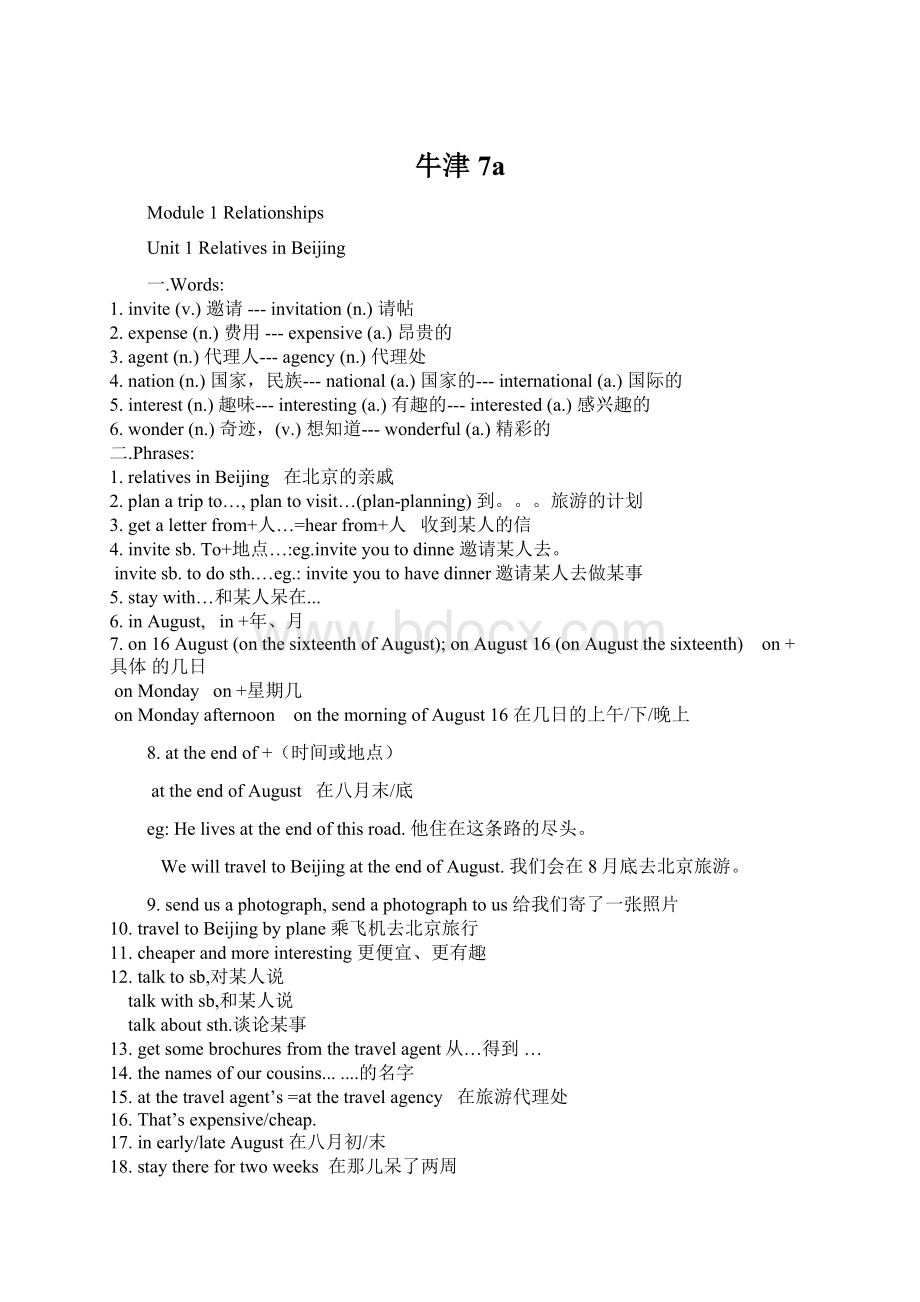牛津7aWord格式文档下载.docx
《牛津7aWord格式文档下载.docx》由会员分享,可在线阅读,更多相关《牛津7aWord格式文档下载.docx(26页珍藏版)》请在冰豆网上搜索。

旅游的计划
3.get
letter
from+人…=hear
from+人
收到某人的信
4.invite
sb.
To+地点…:
eg.invite
you
dinne
邀请某人去。
invite
do
sth.…eg.:
invite
have
dinner邀请某人去做某事
5.stay
with…和某人呆在...
6.in
August,
+年、月
7.on
16
August
(on
the
sixteenth
of
August);
on
sixteenth)
+具体的几日
on
Monday
+星期几
afternoon
morning
16在几日的上午/下/晚上
8.attheendof+(时间或地点)
at
end
在八月末/底
eg:
Helivesattheendofthisroad.他住在这条路的尽头。
WewilltraveltoBeijingattheendofAugust.我们会在8月底去北京旅游。
9.send
us
photograph,
send
photograph
us给我们寄了一张照片
10.travel
by
plane乘飞机去北京旅行
11.cheaper
and
more
interesting更便宜、更有趣
12.talk
sb,对某人说
talk
with
sb,和某人说
about
sth.谈论某事
13.get
some
brochures
from
travel
agent从…得到…
14.the
names
our
cousins.......的名字
15.at
agent’s
=at
在旅游代理处
16.That’s
expensive/cheap.
17.in
early/late
在八月初/末
18.stay
there
for
two
weeks
在那儿呆了两周
stay
until
…
at
come
back
at(
of)
stay
是延续性动词,come
是非延续性动词
19.Thank
sth.
Thank
doing
sth.
因为做
...
而感谢…
三.介词
at:
在某一地点(表示比较狭窄的场所,或是在某一具体的一点。
)
atschool在学校athome在家
in:
在某地内(表示在比较宽敞的场所里)、在……里面
inBeijing在北京intheworld在世界上inthebox在盒子里面
on:
在……上面
onthetable在桌子上onthewall在墙上
under:
在……下面
underthechair在椅子下面underthetree在树下
behind:
在……后面
behindthedoor在门后面behindthehouse在房子后面
beside(by):
在……旁边
beside(by)theman在那个男人旁边
beside(by)thedesk在书桌旁边
infrontof:
在……前面
infrontoftheblackboard在黑板前
infrontofthehouse在房子前面
between:
在两者之间
betweenTomandMike在汤姆和迈克中间
betweenAandB在A和B中间
above:
在……上方
abovetheclouds在云端abovetheseat在位子上方
near:
在……附近
neartheschool学校附近nearthebusstop在车站附近
四.cost,spend,take,pay区别
cost作及物动词时,cost表示某物值多少钱,花费多少钱。
主语必须是物,通常是所买的东西或代词it,不能是人。
cost后跟钱数,也可跟双宾语,意为“某物花某人多少钱”
Theticketcostsme549yuan.
Theticketcostsalotofmoney.
spend指人花费,
表示某人花费多少钱在某物上,或者某人花费多少时间做某事。
spend的主语必须是人,
不能是物。
spend后不可跟不定式。
sb.spend(sometimeormoney)onsth.
sb.spend(sometimeormoney)indoingsth.
Shespentalotofmoneyonthisproject.
Shespentalotofmoneyindoingthisproject.
take指某物花费或需要多少时间,也指做某事花费或需要多少时间主语不能是人,一般用it作形式主语。
Ittakessb.sometimetodosth.
IttakesmeabouttwohoursandahalftotravelfromGardenCitytoBeijing.
pay意思为“付款”,用作及物动词时,它的宾语必须是人或钱,不能是购买的东西,如果要跟购买的物品,必须用payfor。
paysb.付某人钱paymoney付多少钱
paysb.money付某人多少钱
payforsth.为某物付款
paymoneyforsth.为某物付多少钱
五.Whydon’twe…+动词原形…(提建议)我们为什么不…呢?
等于Whynot
+
动词原形?
为什么不…
呢?
等于Whataboutdoing…?
做...怎么样?
这几组表达方式意义相近。
Whydon’tyoujoinus?
=
Whynotjoinus?
Whataboutjoiningus?
为什么不加入我们呢 ?
23.beexcitedabout+n.
因。
而兴奋
六.形容词、副词的比较级和最高级
大多数形容词和副词有比较级和最高级的变化,即原级、比较级和最高级,用来表示事物的等级差别。
原级即形容词的原形,比较级和最高级有规则变化和不规则变化两种。
1)规则变化
单音节词和少数双音节词,加词尾-er,-est来构成比较级和最高级。
构成法
原级
比较级
最高级
一般单音节词未尾加-er,-est
tall(高的)
great(巨大的)
taller
greater
tallest
greatest
以不发音的e结尾的单音词
nice(好的)
large(大的)
nicer
larger
nicest
largest
以一个辅音字母结尾的闭音节单音节词,双写结尾的辅音字母,再加-er,-est
hot热的)
big(大的)
hotter
bigger
hottest
biggest
"
以辅音字母+y"
结尾的双音节词,改y为i,再加-er,-est
easy(容易的)
busy(忙的)
easier
busier
easiest
busiest
其他双音节词和多音节词,在前面加more,most来构成比较级和最高级
Important(重要的)
easily(容易地)
moreimportant
moreeasily
mostimportant
mosteasily
2)不规则变化
原级比较级最高级
good(好的)/well(健康的)betterbest
bad(坏的)/ill(有病的)worseworst
old(老的)older/elderoldest/eldest
much/many(多的)moremost
little(少的)lessleast
far(远的)farther/furtherfarthest/furthest
比较级形容词或副词+than
YouaretallerthanI.
Theylightsinyourroomareasbrightasthoseinmine.
可修饰比较级的词
1)abit,alittle,rather,much,far,byfar,many,alot,lots,agreatdeal,any,still,even等
2)还可以用表示倍数的词或度量名词作修饰语。
3)以上词(除byfar)外,必须置于比较级形容词或副词的前面。
典型例题:
1)Theexperimentwas____easierthanwehadexpected.
A.moreB.muchmoreC.muchD.moremuch
the+最高级+比较范围
TheSaharaisthebiggestdesertintheworld.
形容词最高级前通常必须用定冠词the,副词最高级前可不用。
注意:
序数词通常只修饰最高级。
Africaisthesecondlargestcontinent.
句型转换:
Mikeisthemostintelligentinhisclass.
=Mikeismoreintelligentthananyotherstudentsinhisclass.
练习:
1.Thisboxis___thatone.
A.heavythanB.soheavythan
C.heavierasD.asheavyas
2.Whenwespeaktopeople,weshouldbe'
.
A.aspoliteaspossibleB.aspoliteaspossibly
C.aspolitelyaspossibleD.aspolitelyaspossibly
3.Thisbookis____thatone,but____thanthatone.
A.asdifficultas;
expensive
B.asmoredifficultas;
moreexpensive
C.asdifficultas;
D.moredifficultas;
asexpensive
4.Ithinkthestoryisnotso___asthatone.
A.interestingB.interestedC.moreinterestingD.mostinteresting
5.Hisfatherbegantowork____hewassevenyearsold.
A.asoldasB.asearlyasC.sinceD.while
()1.Ithinkscienceis_thanJapanese.
A.muchimportantB.importantC.muchmoreimportantD.moremuchimportant
()2Thispencilis___thanthatone.
A.longestB.longC.longerD.aslong
()3Mymotherisno___young.
A.shorterB.longerC.littleD.few
()4Thesechildrenare____thisyearthantheywerelastyear.
A.moretallB.moretallerC.verytallerD.muchtaller
()5Itwasveryhotyesterday,butitis___today.
A.evenhotterB.morehotter
C.muchmorehotD.muchhot
6.MrsBlackhasgot____insteadofgettinganybetter.
A.morebadB.alittleworseC.muchbadlyD.alotofworse
7.Whenwearrived,wefoundthemeetingroomcrowdedwith___students.
A.quiteafewB.onlyafewC.fewD.afewquite
8.Thehouseissmallforafamilyofsix.
A.muchtooB.toomuchC.verymuchD.so
9.Throughthewindowwecanseenothingbut____buildings.
A.tallverymanyB.verymanytallC.verytallmanyD.manyverytall
10.-What'
syourbrotherlike?
-Heis___.
A.adriverB.verytallC.myfriendD.atschool
11.Thejacketwasso___thathedecidedtobuyit.
A.muchB.littleC.expensiveD.cheapl
12.Ourclassroomis____largerthantheirs.
A.moreB.quiteC.veryD.much
Unit2Ouranimalfriends
►特殊疑问句
分类:
1、人物:
Who?
(谁?
),Whose?
(谁的?
2、时间:
When?
(什么时候?
),Whattime?
(几点?
),Whatday?
(星期几?
3、地点:
Where?
(哪?
4、事件:
What?
(什么?
),Whatcolor?
(什么颜色?
)Whatnumber?
(多少号?
),Whatfruit?
(什么水果?
5、选择:
Which?
(哪一个?
6、方法:
How?
(怎么?
怎么样?
7、其他:
Howmany?
(多少?
),Howmuch?
(多少钱?
),Howold?
Howoften?
(多少次?
),Howabout?
(关于…怎么样?
用法:
1.疑问词+Be动词+……?
2.疑问词+Do/Does+……?
二.填空:
1.A:
________isit?
B:
It’sgreen.
2.A:
__________isitnow?
It’s4:
30.
3.A:
___________istoday?
TodayisMonday.
4.A:
_____isweatherliketoday?
It’sasunnyday.
5.A:
_____onedoyoulike,redchairsorbluechairs?
Ilikeredchairs.
6.A:
____doyouhavebreakfast?
At6o’clock.
7.A:
____areyou?
IamJack.
8.A:
________isthesky?
It’sblue.
9.A:
_____isshe?
Sheismymother.
10.A:
_____isTom?
Heisinthestore.
11.A:
_____doyouusuallygetup?
Iusuallygetupat6o’clock.
12.A:
___________birdsarethereinthetree?
Ten.
13.A:
___________isthechair?
ThechairistwentyYuan.
14.A:
_____areyou?
I’mfine.
15.A:
______chairisit?
It’smine.
16.A:
__________isitnow?
It’s5o’clock.
17.A:
______doyougotoschool?
Igotoschoolat8o’clock.
18.A:
_____doyoulikeEnglish?
BecauseEnglishisveryimportant.
19.A:
________haveyoulearnedChinese?
IhavelearnedChinesefor5years.
20.A:
_____didyougethere?
Byplane.
21.A:
______bookisit?
It’sTom’s.
22.A:
_________doyouwatchTV?
Onceaweek.
23.A:
______isyourage?
I’m5–year-old.
►以how开头的疑问句
how的用法(指方式、方法)怎样,怎么
你怎么吃呢?
Howdoyoueat?
你怎么去学校?
Howdoyougotoschool?
prefer表示偏好
1.prefertodosth.ratherthandosth.“宁愿做...而不做...
IprefertowatchTVratherthangoout.我宁愿呆在家里也不出去。
2.prefer+名词
——Wouldyoulikemeatorfish?
——I‘dprefermeat,please。
3.prefer+动名词
Doyouprefercoolingforyourself,oreatinginarestaurant?
自己做饭还是喜欢下馆子?
——Doyoulikeswimming?
你喜欢游泳吗?
——Yes,butIprefersaling.喜欢,但我更喜欢驾驶帆船。
4.prefer+不定式
Doyouprefertocookforyourself,ortoeatinarestaurant?
Iprefertospendtheweekendathome.我喜欢在家里度周末。
Iwouldprefertostayathometonight.
Shepreferstobealone.
5.Prefersbtodosth
Theirfatherprefersthemtobehomeearly.他们的父亲宁愿他们早点回家。
Ithoughtyouwouldprefermenottoknock.
6.preferAtoB在A与B之间更喜欢A
Ipreferdogstocats.在狗与猫之间我更喜欢狗。
7.Prefer+todo+ratherthan+do
Heprefertodieratherthanbecometraitor.她宁死也不做叛徒。
Unit3Friendsfromothercountries
现在完成时
一.基本结构:
助动词have/has+过去分词(done)
二. 句型:
否定句:
主语+have/has+not+过去分词+其他.
一般疑问句:
Have/Has+主语+过去分词+其他.
答语:
Yes,主语+have/has.(肯定)
No,主语+haven'
t/hasn'
t.(否定)
三.用法
(1)现在完成时表示过去发生或已经完成的动作对现在造成的影响或结果
Ihavespentallofmymoney(sofar).(含义是:
现在我没有钱花了.)
Guozijunhas(just/already)come.(含义:
郭子君现在在这儿)
Myfatherhasgonetowork.(含义是:
我爸爸现在不在这儿)
(2)现在完成时可以用来表示发生在过去某一时刻的,持续到现在的动作(用行为动词表示)或状态(be动词表示)常与for